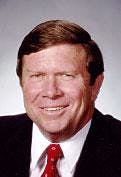OTC: North Sea development needs majors' cash, indies' perspective
The North Sea needs a mixture of major oil and gas companies, which provide large investments, and independent operators, which bring a new perspective to the region, panelists said during the Offshore Technology Conference in Houston.
The North Sea is an evolving prov- ince whose production has peaked and is now gradually declining, UK Department of Trade and Industry (DTI) officials confirmed in a May 6 OTC session. Independents are seen as a key component for future development and production.
In a separate OTC luncheon address May 3, UK Energy Minister Stephen Timms described how the UK government is devising new licensing agreements aimed at encouraging new, smaller players to enter the North Sea arena (OGJ Online, Apr. 3, 2004).
BP PLC's divestiture of its Forties field assets to Apache Corp., Houston, as well as the sale of BP's interests in several southern North Sea gas fields to Perenco PLC helped start a new industry structure in the UK North Sea (OGJ Online, Jan. 20, 2003).
Several other international independents have entered the UK North Sea, including Calgary firms Canadian Natural Resources Ltd., EnCana Corp., and PetroCanada.
"We still need the majors in the North Sea," said Mel Fitzgerald, Halliburton Energy Services Group regional vice-president, Western Europe. "Continued profitable production means new investment. A strong mix of majors and independents is critical."
Fitzgerald called for collaboration between operators, service and supply firms, and the governments of the UK and Norway to maximize the recovery of North Sea oil and gas reserves.
"We have got to look at the North Sea as a complete base," he said. "Drilling rigs have got to be able to move freely across borders." In addition, he called for joint technology development and standardization of equipment for a common North Sea corridor.
Decommissioning costs
Independents are concerned about their financial liability in the North Sea as they buy assets from the majors. Decommissioning costs are one of the thornier issues for companies contemplating investment in the North Sea, Fitzgerald said.
"We've got to look to government to try and solve this problem. It has to be addressed to get assets moving in the North Sea," Fitzgerald said.
Fitzgerald and other panelists agreed that curent high crude oil prices also are discouraging the majors from selling their North Sea assets.
Simon Toole, DTI director of licensing, exploration, and development, acknowledged that decommissioning issues are seen as a barrier to new investment because companies currently must carry expensive letters of credit to prove that they will be able to pay for decommissioning expenses in the future.
"We are not going to wave a magic wand and make decommissioning costs disappear," Toole said. But he said that government and industry are working together to try and come up with a cheaper, more-efficient process.
"I think that there is a lot that can be done. This is a major concern. We can put our heads together and try to find easier solutions," Toole said.
North Sea future
DTI has estimated that the North Sea still has 20-30 billion boe, including proved and probable reserves as well as reserves yet to be discovered. Toole said that fields yet to be found will be smaller than the North Sea's existing large fields.
Meanwhile, operators are getting more successful results with advancing drilling technology on the UK Continental Shelf, he said. "We're not very satisfied with current exploration rates," Toole acknowledged.
Rowan Cos. Inc. CEO Daniel F. McNease said he was encouraged that the UK government is taking steps in the right direction to encourage exploration and drilling. He particularly stressed the need for government incentives to encourage marginal and frontier field development.
"For independents who want to come, the [UK] government is going to sit down with them on a case-by-case basis and work it out," McNease said, adding that the government has waived royalties in some cases. "It looks like the government is willing to work with everyone."
Meanwhile, technology also is helping to reduce costs for operators. McNease cited the $240 million supergorilla class jack up Rowan Gorilla VII as an example.
The Gorilla VII was built with a large deck area and with its own power supplies so that no production platform is needed, which makes decommissioning costs amount to only the cost of plugging and abandoning wells. Oil is transferred from the Gorilla VII to a nearby tanker, he said.
Tuscan Energy (Scotland) Ltd., a wholly owned subsidiary of Aberdeen-based Tuscan Energy Group Ltd., has a drilling and production contract with Rowan for Rowan Gorilla VII. The rig currently is working in Ardmore field (previously Argyll field) in the Central North Sea (OGJ, Apr. 19, 2004, p. 45).
Equity interest
Some players, such as Challenger Minerals Inc. of Houston (CMI), are looking to buy interest in other companies' prospects. CMI, a subsidiary of GlobalSantaFe Corp., screens oil and gas prospects in the Gulf of Mexico and the North Sea. It manages the outsourcing of drilling and completion services and also helps with project financing.
In the North Sea, CMI and joint venture partner, Palace Exploration Co., Tulsa, have interest in Broom field (formerly West Heather field), which is operated by Lundin Petroleum AB.
CMI provided geological, geophysical, and reservoir engineering services and helped provide leveraged capital, as well as the semisubmersible drilling rig GSF Arctic IV to the project.
"We are here to help companies that want to take partners," in the North Sea, said CMI Pres. Thomas J. Morrow. "As these independents come in, there is no telling what we are going to unearth."


